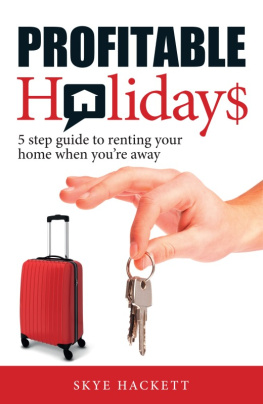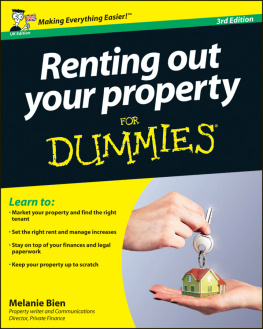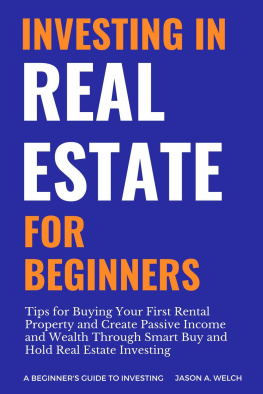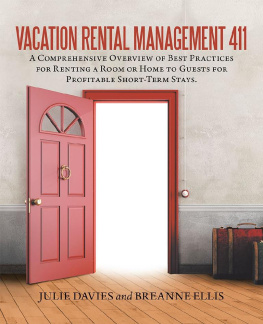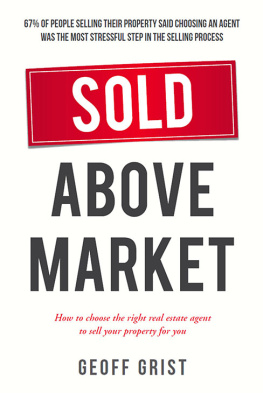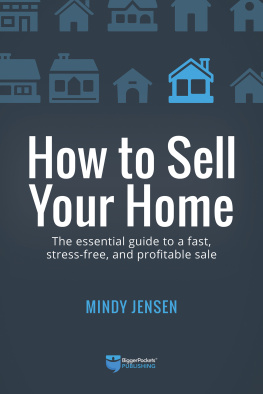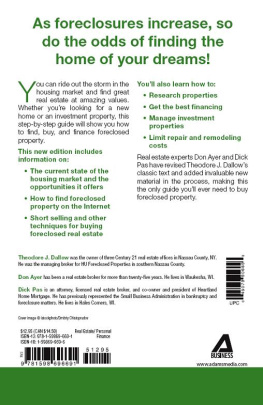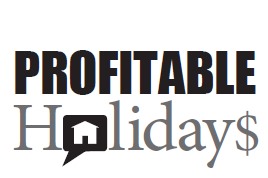First published in 2016 by Skye Hackett
Skye Hackett 2016
The moral rights of the author have been asserted
All rights reserved. Except as permitted under the Australian Copyright Act 1968 (for example, a fair dealing for the purposes of study, research, criticism or review), no part of this book may be reproduced, stored in a retrieval system, communicated or transmitted in any form or by any means without prior written permission.
All inquiries should be made to the author.
Printed in Australia by McPhersons Printing
Project management and text design by Michael Hanrahan Publishing Cover design by Peter Reardon
Disclaimer
The material in this publication is of the nature of general comment only, and does not represent professional advice. It is not intended to provide specific guidance for particular circumstances and it should not be relied on as the basis for any decision to take action or not take action on any matter which it covers. Readers should obtain professional advice where appropriate, before making any such decision. To the maximum extent permitted by law, the author and publisher disclaim all responsibility and liability to any person, arising directly or indirectly from any person taking or not taking action based on the information in this publication.
ISBN: 978-0-9945980-1-1
Contents
Introduction
With over nine million homes in Australia and over 67% being owned outright or purchased with a mortgage, and with the emergence of share accommodation in recent years, the time is now for homeowners to think about short-term rentals. Unsurprisingly, there is a thirst for knowledge surrounding the industry as many have heard about it but dont understand the process, nor are they clear on what short-term rentals actually are.
Hotels have been the go-to accommodation choice for travelers since the dawn of time, however the trend towards private rentals is increasing for both those seeking alternative accommodation and those wanting to boost their income while on holidays by renting out their assets. This started in the UK and Europe and has slowly swept across the globe, with Australia now wholeheartedly embracing the possibilities offered by short-term rentals.
Recent years have seen an explosion of interest in the short-term rental market. The trend to stay like a local and experience the city like a resident is very appealing, and the fact that short-term rentals are on average 35% cheaper than a hotel stay makes them very appealing to both the corporate sector and private renters. Renters not only seek accommodation that is close to work, family or a particular location, they also want it to be unique, and a perfect base to set up in for an extended period. They also want to be able to sit in a caf on the weekend with the locals and experience the area and what it has to offer. In a society where we are all on call 24/7, with mobile devices making it near impossible to escape from work, the stay like a local trend is on the rise.
Why not enjoy your time away, be it for work or pleasure, and have a guest in your property helping to pay the mortgage while youre gone? Why not have a profitable holiday? It is an easy way to get ahead, and more and more people are trying this.
This book will explain the short-term rental market, dispel the many myths surrounding it, and advise on the best ways to find not only the right agent for your property but also the right tenant using your agent and my unique five-step process. Or, if youre going to manage the process yourself, the five-step process will work for you too.
This easy-to-read book can be read cover to cover, or you can flip to the pages you are interested in to refresh or familiarise yourself. The book is filled with examples and anecdotes, but some details have been changed to protect the privacy of those involved.
I wish you all the best with your profitable holidays.
Skye Hackett
June 2016
Part I
Short-term rentals explained
What are short-term rentals?
There are many forms of rentals of residential properties: unfurnished rentals, part furnished rentals and fully furnished rentals.
Fully furnished rentals can then be broken down to:
share accommodation
student accommodation
holiday rentals
serviced accommodation
short-term accommodation.
Short-term rentals are privately owned properties that are self-contained and have cooking facilities included with the property. They are generally rented for periods of less than 90 nights, depending on which state you are in.
When you rent a short-term rental you are renting the entire property, be it an apartment, house or villa. It is set up just like a hotel with all wardrobes empty, fridge bare, and the owners personal items packed away, allowing the tenant to create their own home away from home while they are in the property.
They differ from the more traditional holiday stay in the fact that they range from a couple of nights to weeks, while a holiday stay is more the weekend away or a long weekend break with the owners items still in the wardrobes and food in the fridge it is really like a home swap.
Share accommodation is exactly that; you are not renting the entire property, you are renting a room/ couch/bed or space in the backyard.
Student accommodation is generally like a dorm room or a hostel, or can be a private room. It has only a bed and desk in the room with share cooking facilities and share laundry.
Serviced accommodation is just like a hotel; it is serviced (cleaned) each day. These can be entire suites or apartments.
Who uses short-term rentals?
Short-term rentals are usually for either the extended holiday maker or for business people and students needing residential accommodation for longer stays. Short-term rentals are a niche market that is becoming the go-to choice for accommodation seekers as they are tired of either a hotel or the state some of the holiday rentals are in when they arrive.
How long is short term?
A short-term lease is a lease of a set period of fewer than 60 or 90 nights, depending on what state of Australia your property is in. All forms of short-term rentals are covered by a licensed agreement (such as a short-term lease/holiday lease or terms and conditions) rather than a residential tenancy agreement as per the relevant state and territory residential tenancy legislation.
What types of properties are rented out?
Residential holiday rentals can be anything from a beach shack, a granny flat or share accommodation to entire houses and apartments, and are generally leased directly from the owner to the guest, especially since the emergence of websites such as Airbnb, Stayz and HomeAway.
Short-term rentals are the entire property, be it a studio all the way up to a villa. Many of these are managed by a licensed agent or property manager, but some are self-managed. They can range in furnishings, but even the most basic short-term rental has basic durable furnishings, a mid to large TV, all kitchen utensils, utilities to be included in the rate, linen and towels provided, and a cleaning service offered at the end of the stay.

